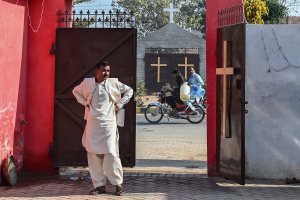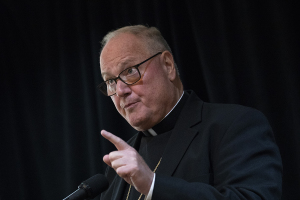Rand Paul Blames Baltimore Violence on 'Breakdown of Family Structure,' 'Lack of Fathers'

Republican presidential hopeful and Kentucky Senator Rand Paul blames the recent outbreak of violence in Baltimore over the death of Freddie Gray on the lack of family structure for the residents of that community.
He expressed his view on the matter during a morning interview with radio host Laura Ingraham and stated that this issue supersedes race and seems to be a growing threat to the U.S.
"It's something we talk about not in the immediate aftermath, but over time," Paul said. "The breakdown of the family structure, the lack of fathers, the lack of sort of a moral code in our society. This isn't just a racial thing. It goes across racial boundaries. But we do have problems in our country, and you see that we're close to the tipping point — closer to the tipping point than many [think]."
Paul also discussed the government's reaction to the riots that broke out in Baltimore which were sparked by the mysterious death of Freddie Gray who died on April 19 after sustaining fatal injuries while being held in police custody a week prior.
"You know, I don't know if there is an answer from the federal government," said Paul when asked what President Barack Obama could have done to stop the rioting. "It obviously is a local problem, primarily. But you do have to have enough show of security, enough of show of police force, to deter the kind of action. Once that happens, it sort of spirals out of control."
Christian leaders such as Dr. Richard Land, president of Southern Evangelical Seminary, cited fatherlessness as an issue shaping the anarchistic attitude of some of the rioters in Baltimore.
"These are all symptoms of a larger malaise which comes from the fact that you have so much fatherlessness in America," said Land to The Christian Post. "You raise children in significant numbers without fathers in the home and you going to have far poorer outcomes than if you raise them with fathers in the home."
Fellow Republican presidential hopeful Marco Rubio believes the breakdown of the family has effected more than just attitudes or beliefs and laid out in a 2013 interview with CBN's "The Brody File" that the issue is "one of the leading causes of poverty."
"I think morality ultimately is the function of the church and our faith, not government, but certainly government cannot be immune from morality, nor can our society because the breakdown in morality is having a direct economic consequence in our country," said Rubio in 2013 to CBN.
"The breakdown of the American family is one of the leading causes of poverty. The breakdown in the American family is one of the leading causes of these instances of violence that we're seeing. The breakdown of the American family is one of the leading causes of educational underperformance."
A report authored by Robert I. Lerman, professor of economics at American University and W. Bradford Wilcox, professor of sociology and director of the National Marriage Project at the University of Virginia presented American Enterprise Institute in 2014 supported the statement made by Rubio a year prior.
The report found that those who grew up in intact homes are better educated, more likely to be employed and have higher levels of income than those raised in broken homes.
Based on their findings, Wilcox stressed the family structure as something to be considered when looking to discussing society's ills.
"We have a lot of discussions these days, when it comes to economic mobility, economic success, poverty, incarceration, teenage pregnancy, about the ways in which race, ethnicity and education help to structure these important social, economic and public outcomes. But we don't think enough or talk enough about the ways family structures these outcomes," said Wilcox.
"We find ... the family factor … is as powerful, or almost as powerful, as things like education, race and ethnicity at predicting young men and women's family income. … We need to reintroduce the family factor in our public conversations about these important outcomes and issues."





























